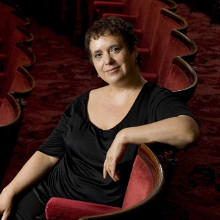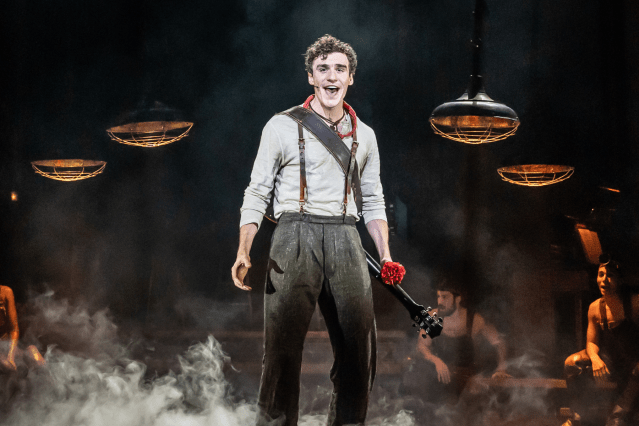Michael Coveney: Critics' Circle holds hands and worries about the future
Michael Coveney reports on the Critics’ Circle’s centenary conference
Did the centenary conference of the Critics' Circle on Friday take full stock of itself and address the challenges of the future? Yes and no. Our host Gavin Henderson, principal of the Royal Central School of Speech and Drama, reminded us how difficult it was, and remains, to attract critics out of town – "bloody difficult" even in Brighton, he averred – while Matt Trueman stirringly suggested that neither he nor his crowd of new critics ever reviewed the sort of theatre they really wanted to see.
To the latter submission I refer the remark of the blessed Sir David Hare when, years ago, I was complaining almost as intemperately as Matt himself. "If that's how you feel." he said, "stop being a bloody critic and do something about it yourself." There's no answer to that.

The out-of-town thing is more complicated these days because of the evaporation of expenses on the arts pages, or anywhere else. When I was first on the Financial Times, I was hauled in one day by the managing editor to learn that I was letting the side down by not travelling first class or ordering wine with my dinner. The same executive then told me to go to the Edinburgh Festival, organise a lunch party in the George Hotel and invite whomsoever I wanted to come along…
Ou sont les neiges d'Anton Chekhov indeed? As for travelling around generally, regardless of the cost, there's still a pervasive sense that if it's not happening in London it's not really happening, pace critics like Susannah Clapp and Lyn Gardner. The great James Agate (predecessor of Harold Hobson) was once invited to review a play in Kew and sought to remind his editor that he was the Sunday Times' dramatic critic, not its foreign correspondent. He was also once asked, while coming out of a taxi at his regular haunt, the Cafe Royal, why he bothered doing the job year in, year out. "Fame," he replied, with a swirl of his cape, "fame, dear boy."
More appealing to Trueman would be the declaration of Kenneth Tynan that, as a critic, he would rather be a war correspondent than a necrologist. But digging up the dead is still part of the job; I've always believed that the present and future of the theatre are only really interesting – or indeed comprehensible – in the context of the past.
The historian Frances Hughes duly obliged with some sharp observations on the contributions made by J T Grein, G B Shaw and C E Montagu (initials in by-lines were big in those days). She might easily have reminded us, too (but didn't) that Shaw said of himself that he launched not a series of judgements aiming at impartiality, "but a siege laid to the theatre of the 19th century by an author who had cut his way into it at the point of a pen and thrown some of its defendants into the moat." To emulate that example, Trueman and co will have to raise their voices above the online babble asap.
Shaw had an agenda. So, to a lesser extent, had Tynan and Harold Hobson. It was sad, really, to hear Nicholas de Jongh ridicule Hobson – and other critics, generally – for being so sheepish about censorship, quoting a mischievous, admittedly vulgar, paragraph by Hobson about a male bare bum on the stage. Without Hobson's lone supportive review of The Birthday Party, Harold Pinter would have given up writing plays; no critic said that, Pinter did.
Hobson and Tynan, in later life, complained that their successors seemed to have nothing at stake in their writing. That's partly because all the battles had been fought and won, mainly thanks to them: the principle of subsidy, the establishment of the National Theatre and the Royal Shakespeare Company, the advent of Beckett, absurdism, satire and the fringe, uncensored speech and thought, new forms of dramaturgy and the acknowledgement of directors' theatre.
When challenged (by me) as to what was the theatre he wanted to be reviewing, Trueman offered Sean Holmes' "Secret Theatre" at the Lyric Hammersmith. Not much to be going on there, I'm afraid. Not so far, anyway. And nobody really explained what was so great or so new about the concept of an "embedded" critic writing about the process from the inside.
There is nothing new. The best books about Peter Brook, for instance, are those written by Geoffrey Reeves, Albert Hunt and ACH Smith, all of whom worked closely with Brook on his most significant modern productions. That kind of critical writing used to appear in dedicated theatre journals – Encore, Theatre Quarterly, Plays and Players – and it's a great shame that such publications have ceased altogether. You can't imagine any newspaper having anything to do with "embedded" criticism, nor should it. You're embedded only to the extent that you (hopefully) know what you're talking about.
Actually, the fight for critics' survival in any shape or form is, as the conference acknowledged, now, well, critical. The "What's the point?" panel had two critics on it – Libby Purves and Kate Bassett – who have lately been relieved of their duties on, respectively, The Times and the Independent on Sunday. Both are planning to continue reviewing online elsewhere.
But as Tom Sutcliffe of the Independent (who has since lost his job there as a television critic) said acidly at the time I parted company with the Daily Mail, you're not really a critic unless you're employed to be one. There's a growing mood, though, that criticism is gathering head on the internet and that agenda-setting debate and discussion will simply move online, in a way it most notably hasn't (so far at least, or not to any great degree) in the realm of political commentary.
On that same panel, Fiona Mountford suggested that criticism could act as a bridge between an audience and a production and even be of value to the theatre itself. Of that I'm more sceptical. Good criticism serves, in the first place, its readership and, in the second, the critic's vanity. No critic ever told a director, playwright or actor something he or she didn't already know that was either good or bad about his production.
You write reviews, quite simply, to convey information as entertainingly as possible. You have no debt to the theatre beyond the authenticity of your own experience. And good critics write to explore what they think about things – a journey of a soul wandering through masterpieces, said Anatole France – and then change the world. Nothing is more boring than critics addressing each other, and there's an awful lot of that going on, much more than there used to be.
We had some lively and much appreciated interventions from the professionals themselves, though: producer Nica Burns said that she was concerned about the threat to criticism in newspapers, adding nonetheless that critics lived too much in a bubble of their own. She was also keen to point out that producers never put anything on because they thought they were going to make money, which elicited a stunned and utterly silent reaction. I'm still reeling from the unexpectedness of it, actually.
Hattie Morahan, currently appearing in A Doll's House at the Duke of York's, expressed a dislike for the "first night" circus, the star ratings (only editors and readers like those; most critics don't) and admitted she was a voracious consumer, nowadays going online where she found the long-form, discursive writing there much more illuminating than the print critics. Jonathan Church, son of a film critic, said that critics did matter but that he wouldn't know what a tweet was if it bit him. And playwright David Eldridge said he always read reviews but takes them much less to heart as he gets older.
Actor Michael Simkins entertained us with some familiar-sounding anecdotes (I'd read most of them in his new book extracts and Daily Telegraph columns). He reckoned most critics wanted shows "to work" but knew he was living in a different world when a young agent recently said to him, "Who's Michael Hordern?" Growing up in Brighton, he had cut his theatregoing teeth on a diet of weekly rep, often thrillers starring Gerald Harper in a cravat, rolling a brandy round a big-bottomed glass while wondering how best to push his wife off the nearest cliff.
Kerry Michael, artistic director of the Theatre Royal, Stratford East, spoke fascinatingly not so much about critics as involving his audience in feedback, creating his own neighbourhood critical environment, probably because the Critics' Circle, as currently constituted, simply doesn't contain any representation of his own theatre's demographic, onstage or off.
In commenting on Dominic Maxwell's appointment to The Times in succession to his own colleague on the newspaper, Libby Purves, Ian Shuttleworth opines in the latest Theatre Record that his and Sarah Hemming's appointment as job-share chief critics in succession to Alastair Macaulay on the Financial Times was the first such "in-house" hand-over in recent memory.
For the record, and as it is called Theatre Record, I should remind him that I succeeded my own boss (B A Young) as the FT's staff critic in 1981 (the year of Theatre Record's, or London Theatre Record's, as it was then called, inception) and that ten years later Charles Spencer succeeded his superior officer on the Daily Telegraph, Charles Osborne, as a result, I think, of Osborne having displeased his editor, Max Hastings, by not sufficiently liking Alan Bennett's three-hour stage version of The Wind in the Willows at the National Theatre.












